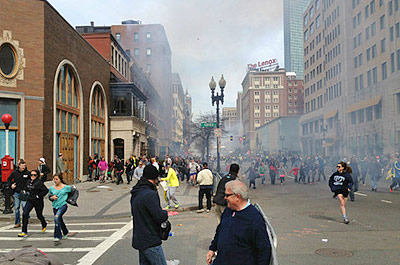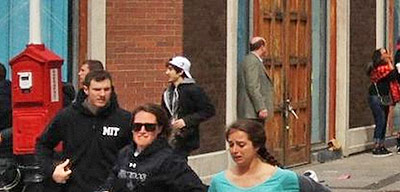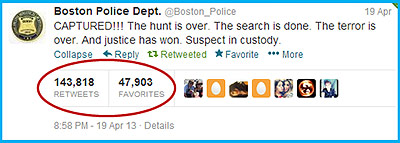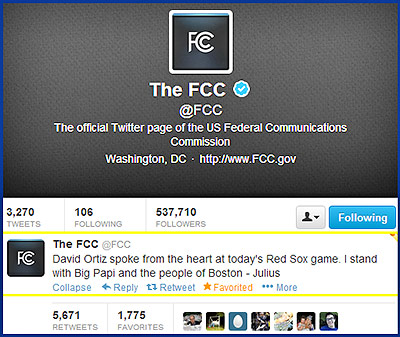-
How Social Media Turned Into A Nationwide Dragnet
April 22, 2013
-
There's no doubt social is revolutionizing the way we experience most everything today as those who participate on these platforms are finding out information faster online than on the radio or TV.
The danger in that is the speed in which information passes allows for misinformation and Photoshopped pictures to spread. It simply stems from people no longer wanting to sit back and consume news – they want to participate and share. Many even become foot soldiers with a quest to help law enforcement spread the word or even wanting to solve the crime.
You could call David Green of Jacksonville, FL an inadvertent foot soldier.
Green told The Associated Press that he snapped one picture with his iPhone when the bombs went off, then put his phone away, and went to help the injured.
Later that day, Green posted the picture on Facebook and typed out heartfelt feelings such as, "I am so saddened by such a random act of violence. So many families affected by it."

Little did he know that this picture he took would become a key piece of evidence for the FBI.
Green said it wasn't until the FBI released photos of the suspected bombers that one of his Facebook friends texted him and told him to take another look at the picture he posted.
Sure enough, after enlarging the photo, it looked like suspect #2 wearing a white baseball hat backwards, was leaving the scene of the bombings but no longer carrying the backpack – as seen in the FBI released photos.

The Boston tragedy is perhaps the first terrorist attack on American soil in the age of the smartphone.
It's also the first where federal, state and local law enforcement collectively tapped into social platforms to pass on correct information to the masses immediately.
From the FBI's use of YouTube to release surveillance video and then employing Twitter and Facebook to get the images widely spread to the Boston Police Department using social to communicate that the ordeal was over – anyone watching this play out felt the power of the digital age.

The Boston radio community also stepped up and connected with its audience socially.
And so did the FCC.
Perhaps the one tweet no one saw coming – but that charmed us all – came from outgoing FCC Chairman Julius Genachowski who took to Twitter for an "instant ruling."
When Boston Red Sox player David Ortiz let a cuss word fly during a live pre-game broadcast – that expletive aired over TV and presumably radio, too, which typically can result in broadcast outlets facing fines.
But under the circumstances, even the Federal Communications Commission – by virtue of Genachowski's tweet – let it slide:

As you see, the tweet was an instant hit garnering over 5,600 retweets.
As you saw from these moments - we communicate differently today. We have the opportunity to instantly speak and be heard. We also no longer have to be dependent on radio or TV to break the news. It's all right there on our smartphones or computers.
In fact, as I followed a Reddit thread on the Boston bombings, someone using the handle "PantsGrenades" posted, "I feel like we've reached a certain threshold here — the Internet is finally outstripping cable news completely. In fact, I wonder if we're inadvertently doing their work for them."
And if you think about it – between citizen sources posting information from the scene, along with law enforcement communicating via social as they did in this situation – are we?
Heavy social media users say they now go to Twitter before traditional news outlets in times of breaking news.
This represents a whole new way of thinking for radio.
The challenge is that real time information in the social space is nowhere near perfect. Wrong information, along with Photoshopped pictures, will get passed around. But real time "reporting" is only going to get bigger as more people want to be part of the action.
With this immediacy of distributing information, the burden lies on us as brands (and personally, too) to sort it out – what's legit and what's not. Find ways to never speculate but to be right there in the moment, too.
It's what your fans are doing – with or without you.
To help the victims affected by the Boston bombings, One Fund is a charity launched by Massachusetts Governor Deval Patrick and Boston Mayor Tom Menino.
Reach out to me on Twitter anytime @lorilewis
Reach out to me anytime on Facebook, Instagram, LinkedIn or Twitter.
Please enjoy MERGE archives here.
